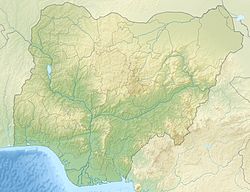| Ameki Formation | |
|---|---|
| Stratigraphic range: Lutetian-Bartonian | |
| Type | Geological formation |
| Unit of | Bende-Ameki Group |
| Lithology | |
| Primary | Shale |
| Other | Sandstone, siltstone |
| Location | |
| Coordinates | 6°00′N 7°00′E / 6.0°N 7.0°E / 6.0; 7.0 |
| Approximate paleocoordinates | 1°36′N 1°30′E / 1.6°N 1.5°E / 1.6; 1.5 |
| Country | |
| Extent | Niger Delta Basin |
| Type section | |
| Named for | Ameki |
 | |
The Ameki Formation is a Lutetian to Bartonian geological formation located in Nigeria. It belongs to the Bende-Ameki Group, which also consists of two formations namely Nanka Formation, Nsugbe Formation.
Fossil content
Among others, the following fossils have been reported in the formation:
Mammals
| Mammals reported from the Ameki Formation | |||||
|---|---|---|---|---|---|
| Genus | Species | Presence | Material | Notes | Images |
| Pappocetus | P. lugardi | Ombialla District. | Mandibles. | A protocetid. | |
Reptiles
Birds
| Birds reported from the Ameki Formation | |||||
|---|---|---|---|---|---|
| Genus | Species | Presence | Material | Notes | Images |
| Gigantornis | G. eaglesomei | A pelagornithid. | |||
Squamates
| Squamates reported from the Ameki Formation | |||||
|---|---|---|---|---|---|
| Genus | Species | Presence | Material | Notes | Images |
| Pterosphenus | Trunk vertebra. | A palaeophiid. | |||
Turtles
| Turtles reported from the Ameki Formation | |||||
|---|---|---|---|---|---|
| Genus | Species | Presence | Material | Notes | Images |
| Cosmochelys | C. dolloi | Ombialla District. | Portions of carapace. | A dermochelyid. | |
Invertebrates
Cephalopods
| Cephalopods reported from the Ameki Formation | |||||
|---|---|---|---|---|---|
| Genus | Species | Presence | Material | Notes | Images |
| Deltoidonautilus | D. nwajidei | Multiple specimens. | A nautiloid. | ||
See also
References
- Ogbe, Ovie B.; Osokpor, Jerry (2021-01-01). "Depositional facies, sequence stratigraphy and reservoir potential of the Eocene Nanka Formation of the Ameki Group in Agu-Awka and Umunya, southeast Nigeria". Heliyon. 7 (1): e05846. Bibcode:2021Heliy...705846O. doi:10.1016/j.heliyon.2020.e05846. ISSN 2405-8440. PMC 7820494. PMID 33521344.
- ^ Odumodu, Chukwuemeka; Nfor, Bruno (January 2012). "A New Paratype of an Eocene Nautiloid From the Ameki Formation, Southeastern Nigeria: Implications for Age and Paleoenvironmental Interpretation". Stratigraphy and Sedimentology of Oil-Gas Basins.
- Ameki at Fossilworks.org
- Port Harcourt at Fossilworks.org
- ^ Andrews, C. W. (December 1919). "A Description of New Species of Zeuglodont and of Leathery Turtle from the Eocene of Southern Nigeria". Proceedings of the Zoological Society of London. 89 (3–4): 309–319. doi:10.1111/j.1096-3642.1919.tb02124.x. ISSN 0370-2774.
- McLeod, Samuel A.; Barnes, Lawrence G. (January 1996). "The Systematic Position of Pappocetus Lugardi and a New Taxon From North America (Archaeoceti: Protocetidae)". The Paleontological Society Special Publications. 8: 270. doi:10.1017/S2475262200002720. ISSN 2475-2622.
- Georgalis, Georgios L. (2023-06-19). "First potential occurrence of the large aquatic snake Pterosphenus (Serpentes, Palaeophiidae) from Nigeria, with further documentation of Pterosphenus schweinfurthi from Egypt". Alcheringa: An Australasian Journal of Palaeontology. 47 (3): 327–335. Bibcode:2023Alch...47..327G. doi:10.1080/03115518.2023.2217874. ISSN 0311-5518. S2CID 259422068.
Further reading
- Vickers-Rich, Patricia & Rich, Thomas Hewett (1993); Wildlife of Gondwana. Reed. ISBN 0-7301-0315-3